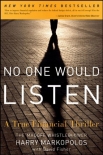No One Would Listen: A True Financial Thriller by Harry Markopolos (rainbow fish read aloud .txt) 📗

- Author: Harry Markopolos
Book online «No One Would Listen: A True Financial Thriller by Harry Markopolos (rainbow fish read aloud .txt) 📗». Author Harry Markopolos
More often, though, I got caught. Detention was held on Saturday mornings, when our job was to clean the school. I was a regular in detention. My parents never knew, though; I managed to convince my mother that I was in a special honors program that met on Saturday mornings. She would brag to her friends that her son Harry was so smart he was invited to attend honors classes on Saturdays!
At Cathedral Prep the difference between right and wrong was demonstrated to me on a daily basis. I learned there that actions had consequences. When I began working in the financial industry I learned very quickly that dishonest actions also had consequences—often you ended up making a lot more money. The most valuable commodity in the financial industry is information. Manipulating the market in any way that gives an individual access to information not available to other people on an equal basis is illegal. In early 1988 I was promoted to over-the-counter trader. I was making a market in about 18 NASDAQ stocks. One of the companies with which I traded regularly was Madoff Securities. That was the first time I had ever heard the name. All I knew was that it was a large and well-respected company at the other end of the phone. Madoff was a market maker—the middleman between buyers and sellers of stocks—and if you were dealing in over-the-counter stocks, eventually you had to do business with Madoff. It was soon after I started trading that I encountered massive violations taking place on an hourly basis. This was not true at Madoff specifically; in fact, I don’t remember a single incident in which its brokers were dishonest. But I had just learned all the regulations, and I saw them broken every day, every hour; and everybody knew about it and nobody seemed to care. The regulations were quite clear. The sellers in a deal have 90 seconds to report a trade. By not reporting it they were allowing the price to stay at levels different from those that would have resulted if the trading volume had been reported. Basically, it meant they were trading on inside information, which is a felony. It causes a lack of the transparency that is necessary to maintain fair and orderly markets.
This happened in my trades every day. It was an accepted way of doing business, although I couldn’t accept it. I would report it regularly to the district office of the National Association of Securities Dealers (NASD) in Philadelphia, and they never did a thing about it.
My younger brother had similar experiences. At one point he was hired by a respected brokerage firm in New Jersey to run its trading desk. On his first morning there he walked into the office and discovered that the Bloomberg terminals that supposedly had been ordered hadn’t arrived. Then he found out that the traders didn’t have their Series 7 licenses, meaning they weren’t allowed to trade. And then he learned that the CEO had some Regulation 144 private placement stock, which legally is not allowed to be sold. But the CEO had inside information that bad news was coming and he wanted to sell the stock. My brother explained to the CEO, “You can’t sell this stock. It’s a felony.” The CEO assured him he understood.
My brother went out to lunch with the Bloomberg rep to try to get the terminals installed that he needed to start trading. By the time he returned to the office, the unlicensed traders had illegally sold the private placement stock based on insider information. My brother had walked into a perfect Wall Street storm.
He called me in a panic. “What do I do?”
I said, “These are felonies. The first thing to do is write your resignation letter. The second thing you do is get copies of all the trade tickets; get all the evidence you can on your way out the door. And the third thing you do is go home and type up everything and send it to the NASD.” That’s exactly what he did. The NASD did absolutely nothing. These were clear felonies and the NASD didn’t even respond to his complaint.
When I started at Makefield in 1987, the industry was just beginning to become computerized, so most of the business was still done on the phone. I would spend all day with a phone hanging from my ear. I spoke with many of the same people every day and often got to know them well—even though I never met them in person. Among the people I most enjoyed speaking with was a client named Greg Hryb, who was with Kidder Peabody’s asset management arm, Webster Capital. Greg was nice enough to take time during those calls to teach me the business. When he started his own asset management firm, Darien Capital Management, in June 1988, he hired me as an assistant portfolio manager and an asset manager trainee. I moved to Darien, Connecticut, that August, and it was there that my education really began.
Darien Capital Management was a small firm; there were only four or five of us working there. But in the early 1990s we were managing slightly more than a billion dollars. And that’s when a billion dollars was a lot of money. We considered ourselves an asset management firm, but we operated as a hedge fund. Because we were so small, each of us had to wear many hats, which was a great opportunity for me. I did everything there from routine correspondence, monthly client statements, and handling of compliance issues to assisting a very good fixed-income portfolio manager. It was a lot of





Comments (0)